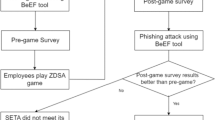Abstract
Casual gamers, especially those without knowledge and unskilled with security, cause most online game cybersecurity issues. Cybercriminals exploit this thinking by breaching security. Online gamers of all ages and backgrounds have increased due to the COVID-19 suspension, exposing them to cyberattacks. These attacks exploit online players’ cybersecurity ignorance to enhance cybersecurity breaches in online games. In light of these problems, this study examined Malaysian online gamer knowledge, attitude, and behaviour. This study examines passwords, email, Internet, device, and social engineering to assess online gamers’ cyber security awareness. The study of 162 online gamers from Facebook, Discord, Twitter, and Twitch discovered that 55% of respondents carelessly keep their gaming account password and more than 56% of respondents’ gaming PCs are not antivirus-protected. Given the in-game function that links credit and debit cards to gaming accounts, gamers’ cybersecurity expertise is concerning. This shows how cybersecurity awareness may protect gamers from hackers.
Access this chapter
Tax calculation will be finalised at checkout
Purchases are for personal use only
Similar content being viewed by others
References
Dahabiyeh, L., Najjar, M.S., Agrawal, D.: When ignorance is bliss: the role of curiosity in online games adoption. Entertain. Comput. 37, 100398 (2021)
Ahmet, E.F.E., Emre, Ö.N.A.L.: ONLINE game security: a case study of an MMO strategy game. Gazi Univ. J. Sci. A Eng. Innov. 7(2), 43–57 (2020)
Grandhi, S.R., Galimotu, N.C.: Understanding social engineering threats in massively multiplayer online role-playing games: an issue review. GAP Indian J. Forensics Behav. Sci. 1(1), 66–71 (2020)
Taylor, D.P.J., et al.: Forensic investigation of cross platform massively multiplayer online games: Minecraft as a case study. Sci. Justice 59(3), 337–348 (2019)
Munir, S., Baig, M.S.I.: Challenges and Security Aspects of Blockchain Based Online Multiplayer Games (2019)
Qusa, H., Tarazi, J.: Cyber-hero: a gamification framework for cyber security awareness for high schools students. In: 2021 IEEE 11th Annual Computing and Communication Workshop and Conference (CCWC). IEEE (2021)
Hokroh, M., Green, G.: Online video games adoption: toward an online game adoption model. Int. J. Res. Bus. Soc. Sci. 8(4), 163–171 (2019)
Alturki, A., Alshwihi, N., Algarni, A.: Factors influencing players’ susceptibility to social engineering in social gaming networks. IEEE Access 8, 97383–97391 (2020)
Fuentes, M.R., Mercês, F.: Cheats, hacks, and cyberattacks. Trend Micro Res. 8 (2019)
Salem, Y., Moreb, M., Rabayah, K.S.: Evaluation of information security awareness among Palestinian learners. In: 2021 International Conference on Information Technology (ICIT), pp. 21–26. IEEE (2021)
Zwilling, M., et al.: Cyber security awareness, knowledge and behavior: a comparative study. J. Comput. Inf. Syst. 62(1), 82–97 (2022)
Mohammad, T., Hussin, N.A.M., Husin, M.H.: Online safety awareness and human factors: an application of the theory of human ecology. Technol. Soc. 68, 101823 (2022)
Amron, M.T., et al.: The validity and reliability evaluation of instruments for cloud computing acceptance study. In: 2020 6th International Conference on Information Management (ICIM). IEEE (2020)
Wang, Y., et al.: Framework of raising cyber security awareness. In: 2018 IEEE 18th International Conference on Communication Technology (ICCT). IEEE (2018)
Khader, M., Karam, M., Fares, H.: Cybersecurity awareness framework for academia. Information 12(10), 417 (2021)
Acknowledgements
This work was supported by Universiti Teknologi Malaysia under UTM Quick Win Research Grant (R.K130000.7756.4J574).
Author information
Authors and Affiliations
Corresponding author
Editor information
Editors and Affiliations
Rights and permissions
Copyright information
© 2023 The Author(s), under exclusive license to Springer Nature Switzerland AG
About this paper
Cite this paper
Zolkiffli, J., Bakar, N.A.A., Ya’acob, S., Salehuddin, H., Hussien, S.S. (2023). The Assessment of Online Games’ Cyber Security Awareness Level Based on Knowledge, Attitudes, and Behaviour Model. In: Uden, L., Ting, IH. (eds) Knowledge Management in Organisations. KMO 2023. Communications in Computer and Information Science, vol 1825. Springer, Cham. https://doi.org/10.1007/978-3-031-34045-1_26
Download citation
DOI: https://doi.org/10.1007/978-3-031-34045-1_26
Published:
Publisher Name: Springer, Cham
Print ISBN: 978-3-031-34044-4
Online ISBN: 978-3-031-34045-1
eBook Packages: Computer ScienceComputer Science (R0)




